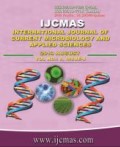


 National Academy of Agricultural Sciences (NAAS)
National Academy of Agricultural Sciences (NAAS)

|
PRINT ISSN : 2319-7692
Online ISSN : 2319-7706 Issues : 12 per year Publisher : Excellent Publishers Email : editorijcmas@gmail.com / submit@ijcmas.com Editor-in-chief: Dr.M.Prakash Index Copernicus ICV 2018: 95.39 NAAS RATING 2020: 5.38 |
Agriculture is the mainstay sector of the country’s economy. Now a day’s various technologies, innovative ideas have ensured the development of agriculture. The farmers are not following the newer as well as innovative practices because of the lack of interest, lack of awareness and lack of training on the particular technology. Every agricultural Extension Scientists try to reduce the farmer’s problem, even though lacks are there, to transfer the technology from the lab to land. Krishi Vigyan Kendra is India’s innovative institution to transfer the technology at the grass root level. The study was taken up in Sivagangai district of Tamil Nadu. A total of 120 trainees were selected as respondent using proportionate random sampling technique. Keeping in this view, the study was focused and finally, an attempt has been made to identify the constraints faced by the trainees in adopting the recommended practices. The specific objectives of this study are to delineate the constraints to the Programme coordinators for the effective functioning of KVKs. Constraints were categorized under various components viz. general constraints, biophysical constraints, technological constraints, and other constraints. Among the general constraints, the non-availability of skilled labor and high cost of herbicides were expressed by the majority of the respondents. Among the biophysical constraints, drought and monsoon failure was reported by most of the respondents. Among the technological constraints, non-availability of bio-fertilizer at the time of sowing was considered as the major constraint. Among the institutional constraints, lack of transport facilities was considered as an important constraint faced by most of the respondents.
 |
 |
 |
 |
 |